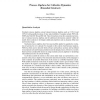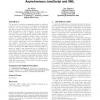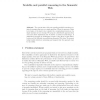93 search results - page 17 / 19 » Can Order of Access to Learning Resources Predict Success |
MPC
2010
Springer
13 years 12 months ago
2010
Springer
d Abstract) Jane Hillston Laboratory for Foundations of Computer Science, The University of Edinburgh, Scotland Quantitative Analysis Stochastic process algebras extend classical p...
IEEEPACT
2009
IEEE
2009
IEEE
Soft-OLP: Improving Hardware Cache Performance through Software-Controlled Object-Level Partitioning
14 years 1 months ago
—Performance degradation of memory-intensive programs caused by the LRU policy’s inability to handle weaklocality data accesses in the last level cache is increasingly serious ...
AI
2002
Springer
13 years 7 months ago
2002
Springer
Neural network ensemble is a learning paradigm where many neural networks are jointly used to solve a problem. In this paper, the relationship between the ensemble and its compone...
GECCO
2007
Springer
14 years 1 months ago
2007
Springer
The success of a genetic programming system in solving a problem is often a function of the available computational resources. For many problems, the larger the population size an...
ESWS
2010
Springer
13 years 11 months ago
2010
Springer
Abstract. The current state of the art regarding scalable reasoning consists of programs that run on a single machine. When the amount of data is too large, or the logic is too com...



